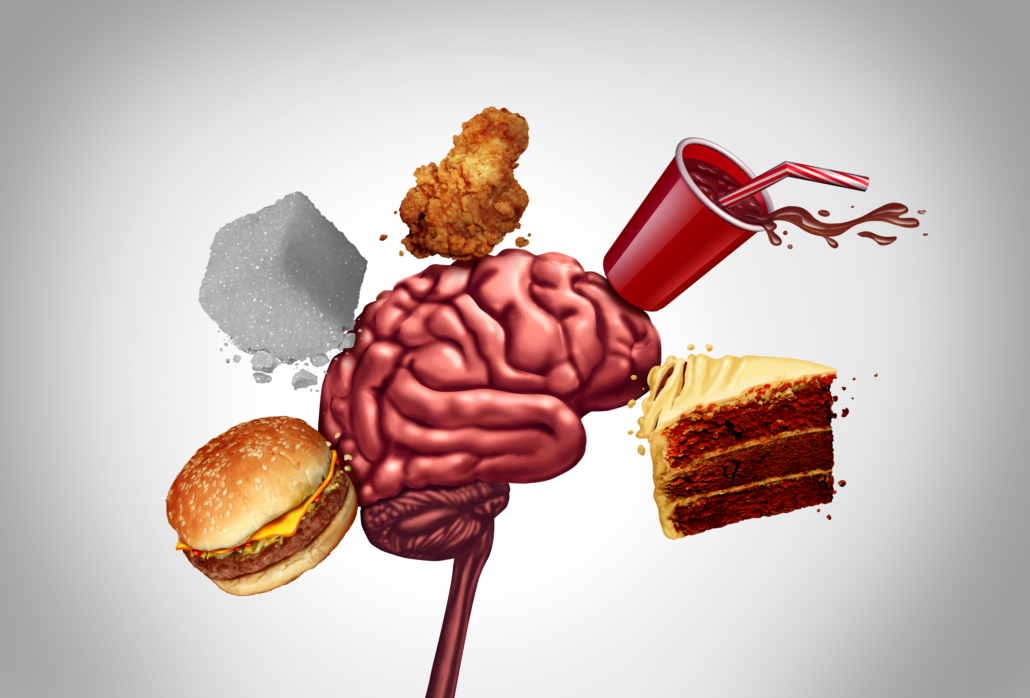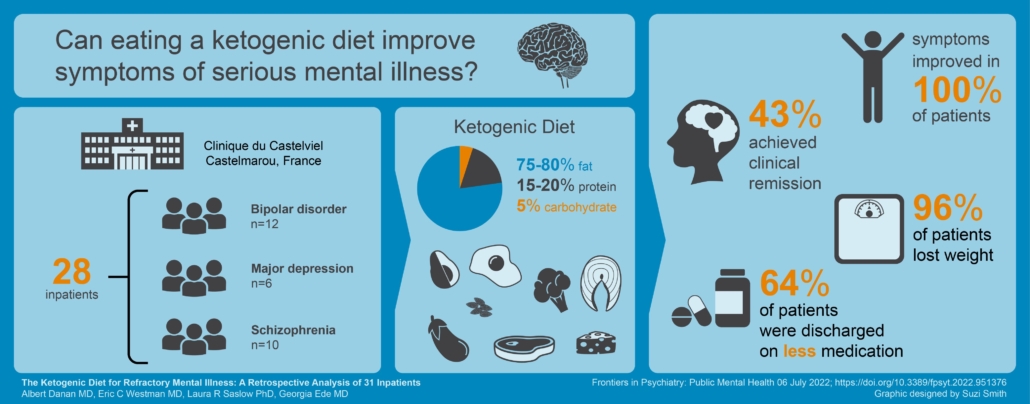We include products in articles we think are useful for our readers. If you buy products or services through links on our website, we may earn a small commission.
What are the Effects of Sugar on the Brain?

Most people know about the adverse effects of high-sugar diets on physical health, such as obesity, diabetes, premature aging, heart disease, and various inflammatory diseases. But the effects of sugar on the brain are only beginning to receive the attention they deserve.
In this article, we’ll explore the ways that excessive sugar consumption can be harmful to brain health, and how these effects can show up as issues like impaired memory, mood disorders, sugar addiction, and dementia.
Table of Contents
The Role of Sugar in the Brain
All carbohydrates from table sugar to grains, beans, fruits, and vegetables, get broken down into glucose, AKA blood sugar.
Your brain is an energy-hungry machine and uses 20% of the glucose in your blood to feed its cells.
However, your body can make all the glucose it needs from protein without you having to consume any carbohydrates whatsoever.
In fact, only fat and protein are essential nutrients. In nutritional jargon, “essential” has specifically means that you need to consume them from food in order to survive.
The U.S. Food and Nutrition Board of the Institute of Medicine, states, “The lower limit of dietary carbohydrate compatible with life apparently is zero, provided that adequate amounts of protein and fat are consumed.”
Yet, when consuming a Standard American Diet (SAD) loaded with grains and added sugars, you’re getting over 250 grams of carbohydrates per day. With 82 grams coming directly from added sugars, and nearly all of the rest coming from grains and starches.
Keep in mind that the human body evolved over 2.5 million years of evolution on a hypercarnivorous diet of mostly fatty meat. There was no such thing as processed sugar, fruit was only sporadically available, and nothing like the ultra-sweet Frankenfruits created by industrial agriculture, and cultivated grains, legumes, and tubers didn’t exist.
Simply put, no part of our bodies is made to handle all this excess sugar, including our brain. And since our brain is the control center of our bodies, the effects of sugar on the brain can have a devastating impact on our health and well-being in various ways.
Let’s turn to these specific effects of sugar on the brain now.
Sugar Addiction
Sugar has been found to reinforce neural pathways associated with addiction and to drive addictive sugar cravings and behavior.
This makes sense when considering that early humans would seldom come upon sources of sugar like ripe fruit and honey. When they did, the brain compelled them to eat as much as possible.
The body responded to this torrent of glucose by secreting insulin which turned the sugar into body fat that could be broken down for energy in leaner times. Insulin also triggers hormones and neurochemicals that both increase hunger and heighten the pleasure of sweet tastes.
This process was meant to be temporary and intermittent. But in our modern food system, sugar is easily available so the addictive system never turns off.
A 2013 study by Harvard researcher David Ludwig found that people who consumed simple carbohydrates had significant activation of opiate and dopamine receptors in the craving and reward center of the brain.
Repeatedly stimulating the reward center of your brain with simple carbs has been found to create a higher set point of your body fat levels. Once you increase body fat levels from excess sugar, your body undergoes hormonal changes in an attempt to preserve the fat.
A 2013 study on rats found that the rewards experienced by the brain after consuming sugar are even “more rewarding and attractive” than the effects of cocaine.
Another animal study at Connecticut College showed that Oreo cookies activate more neurons in the brain’s pleasure center than cocaine! And in case you’re wondering, just like humans, the rats ate the filling first.
The ability of sugar to create superior and often irresistible neurological reward signals that override self-control mechanisms is a leading cause of overconsumption of sugar that leads to obesity and various other metabolic diseases.
Impaired Memory and Cognitive Ability
Sugar consumption has been linked to changes in gut bacteria, inflammation in the brain, and damaged nerve and glial cells which all contribute to various cognitive impairments.
A 2016 study on rats found inflammatory markers in the hippocampus that negatively impacted memory of rats fed a high-sugar diet.
A 2021 study found that daily intake of sugar-sweetened beverages during teenage years is associated with decreased learning abilities and poorer memory in adulthood. The researchers linked these impairments to altered gut bacteria.
The good news, however, is this inflammatory damage from sugar may not be permanent.
A 2017 study in the journal Appetite found that the memory damage caused by sugar consumption can be reversed by following a low-sugar, low-GI diet.
Alzheimer’s Disease
That temporary ‘sugar high’ that many of us get addicted to may actually be a stress response to dangerously high blood sugar levels.
Various studies link chronically high blood sugar to Alzheimer’s disease to the point where many researchers have taken to calling Alzheimer’s “type 3 diabetes.”
A 2015 review of various studies on the impact of insulin resistance on cognitive decline found that diabetes and Alzheimer’s overlap by around 80%.
One link between sugar and Alzheimer’s has to do with how excessive insulin can damage the hippocampus, an area of the brain where early signs of Alzheimer’s often show up.
Diets high in added sugar have also been found to reduce the production of a hormone called brain-derived neurotrophic factor (BDNF).5 BDNF is critical to the creation of new neural networks that facilitate memory formation and learning.
A 2019 review of 15 studies found that lower levels of BDNF are linked to dementia and Alzheimer’s disease.
Brain Shrinkage and Vascular Dementia
High sugar consumption has been found to cause impaired glucose metabolism and abnormal insulin function in the brain, which contribute to brain shrinkage and restricted blood flow to the brain. These effects can lead to vascular dementia.
Dopamine Imbalance and Psychological Disorders
High sugar consumption has been found to have negative impacts on mood.
A 2017 study looking at the effects of consuming sweet food and beverages on 23,245 participants found a 23% increase in risk of being diagnosed with common mental disorders such as depression and anxiety after five years. These findings were independent of exercise, socio-demographic factors, other dietary factors, body fat levels, and other diseases.
The study authors concluded, “Our research confirms an adverse effect of sugar intake from sweet food/beverage on long-term psychological health.”
A 2023 study on obese individuals found that higher total sugar consumption was significantly associated with an increased risk of depressive symptoms that required clinical treatment.
Researchers revealed similar findings in a controlled animal study where a diet high in refined carbs was shown to result in anxiety and depressive-like behaviors after the animals were stressed.
One of the factors in the negative impact of sugar on mood and psychological health may have to do with dopamine. Dopamine is a neurotransmitter with significant impacts on mood, behavior, learning, and memory.
Studies have found that consuming a chronically high-sugar diet can affect both the gene expression and availability of dopamine receptors in certain areas of the brain.
The good news is that dramatically reducing carbohydrates can have profoundly beneficial effects on mental health, even for people with medicated psychiatric disorders.
A bellwether 2022 controlled feeding study looking at the effects of a very low-carb ketogenic diet on 31 psychiatric inpatients who were not being helped by standard treatment methods such as medication and therapy found
- The 28 patients who made it past day 6 ate a keto diet for between 14 and 248 days
- All patients experienced significant and substantial improvements in depression and psychosis symptoms and multiple markers of metabolic health.
- 100% of participants had improved symptoms
- 96% of patients lost weight
- 64% of patients reduced or discontinued medication
- 43% achieved clinical remission

Similar findings were revealed in a 2020 study conducted by researchers at Harvard University. Examining data from over 2,000 people who ate an essentially zero-carb keto-carnivore diet for at least six months found that 96% of participants improved or resolved psychiatric symptoms.
How to Protect Your Brain from Excess Sugar

The key to protecting your brain from the negative effects of sugar is to take steps to reduce sugar intake. But since sugar is addictive for most people, you have to implement strategies and behaviors that don’t focus on willpower alone.
- Discard all sugar in your house: Scour your fridge, freezer, and pantry, and get rid of all carb-heavy foods.
- Practice mindful eating: Take note of your emotional and environmental triggers. Ask your self-judgment to relax and make some space. By bringing awareness to the link between craving and behavior, you break the automatic response circuit and create the potential for healthier choices.
- Adopt a Ketogenic or Carnivore Diet. These high-fat, low-to-no-carb diets realign your metabolism with the whole foods humans evolved to thrive on. Your body undergoes significant metabolic changes that reduce inflammation and rebalance hormones in the brain. Numerous studies have found that a ketogenic diet can be beneficial for various brain conditions, including Alzheimer’s and Parkinson’s. Carnivore enthusiasts such as Joe Rogan, Jordan Peterson, and Mikhaila Peterson have expressed the profoundly positive impacts of the carnivore diet on their mental health challenges.
- Game plan: Before going into situations like birthdays and sporting events where high-carb foods are the norm, load up on healthy fat and protein-rich superfoods like red meat and eggs.
- Consistent physical movement: Being more physically active has been found to stimulate the release of happy chemicals like endorphins and dopamine that can fill the void that you’d otherwise plug with sugary foods. Walking, cycling, yoga, and swimming are all fantastic low-impact ways to achieve a natural high.
Effects of Sugar on the Brain: The Bottom Line
The human body and brain evolved over millions of years on a diet of very low-carb animal-based foods. Yet, our modern food systems are based on high-carbohydrate grains and added sugars. The chronic overconsumption of sugar has profoundly negative impacts on the brain.
The negative effects of sugar on the brain include overstimulation of reward centers, leading to addictive consumption of high-sugar foods, resulting in obesity, inflammation, mood disorders, impaired learning and memory, and neurodegenerative disorders.
To reverse and resolve the various neurological, psychological, and physiological ailments caused by excess sugar intake, it is appropriate to treat sugar like the addictive substance that it is. Eliminate easy access to sugary foods in your home and adopt a lower carbohydrate lifestyle.














